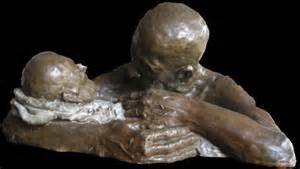And at the end of eight days, when he was circumcised, he was called Jesus, the name given by the angel before he was conceived in the womb. Luke 2:21
Did he cry when the knife cut? They all do, even though at that age it isn’t supposed to hurt much. Beads of red appear along the cut, quickly blotted away. He is now a covenant son, like every baby boy born under the Law of Moses. Words are spoken over him as he is re-wrapped in swaddling clothes and given back to his mother, to be quickly consoled against her beating heart.
In the early days of motherhood, completely dominated by this little scrap of a person as all new mothers are, his unique origin is apt to slip Mary’s mind. He’s so like any baby: small, weak, not a thought in his head or a single muscle under his control, just a bundle of sensation and emotion. He’s not one of those continually wailing ones that make everyone within earshot suffer as much as they suffer. He’s calm; a blessing. She loves him fiercely, overwhelmingly, like any mother.
And when the day came for them to be purified as laid down by the Law of Moses, they took him up to Jerusalem to present him to the Lord, observing that stands written in the Law of the Lord: “Every first-born male must be consecrated to the Lord.” Luke 2:22-23

In his room in the temple complex, an old man feels a jolt. He know what it is–his old companion, the Spirit of the Lord, is speaking to him. His weary back straightens; his rheumy eyes grow bright–Yes? He’s here? Now? He rises, and with the firm step of a much younger man he leaves his room and passes through a portal leading to the temple courtyard.
Old Simeon has a reputation and profound respect; when he appears in public–rare enough these days–people notice and whispers follow. Learned teachers and priests even break away from their occupations and trail discreetly after him to see what he’s up to, sol purposeful. He approaches the corner of the courtyard where babies are dedicated to the Lord and sacrifices offered for the mother’s purification. A very common sight, couples with babies, and one quick glance would tell any observer that this couple is dirt-poor. The little wooden cage the man is holding gives them away–two pigeons is all they can afford for the purification sacrifice, unlike the wealthier family, walking proudly away with their own newborn son, their clothes lightly spattered with the blood of a lamb. The officiating priest has just taken the second bird from its cage; with bored, practiced movement he wrings its neck, choking off its startled cry. When Simeon barges upon the scene the priest looks up with a peeved scowl, quickly smoothed over when he sees who it is.
The parents don’t know who it is, but the old man carries an aura of authority about him, and when he stretches out his arms with the eagerness of a youth reaching for his bride, the mother hands over her baby without hesitation. The bystanders glance at each other, their curiosity piqued. Some may have murmured to each other, “Look at his face.” It is transformed—almost youthful, or like Moses perhaps, come down from the mountain with his face alight. Those who look to the Lord are radiant . . . Simeon places one trembling veiny hand on the baby’s head. Then he speaks, in clear tones that those who know him had not heard for years, even though he was not speaking to them. He is speaking to God: “My eyes have seen your salvation . . . “ What, the baby? The squirming infant who opens his dark wide eyes and stares hard at the old prophet, almost as if he understood?
The priests and Levites debated for years afterward what Simeon had actually said, especially after he was no longer around to tell them. They should have just asked his mother, because the old man’s words had cut into her mind–one of the many, many peculiar instances surrounding this child she would recall and brood over for years to come. The words rise like the sun, spreading warmth through her taut bones: deliverance, salvation, light to the world . . .
But then: “He will be like a sword that meets opposing flesh and cleaves joint from marrow, and the sword will also pierce your soul.”
His eyes meet hers as he delivers the child back to her arms. For the slightest moment he hesitates, as though reluctant to give the baby up, or reluctant to deliver this last word. But the word is on his heart, and forever after it will burden hers.
The couple from Galilee return home, after a sojourn in Egypt. And then, years of silence. We’re not told much about Jesus’s boyhood, probably because there’s not much to tell: no miraculous works or perturbing words, just peasant boy growing up in a provincial village, causing no trouble. No trouble at all. Except for that one time.
To be continued . . .
_________________________________________
For the first post in this series, go here.
Next>
